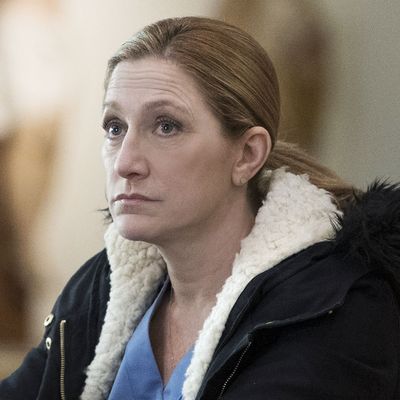
Nurse Jackie was never quite a perfect show. Beautifully performed, certainly. Gutsy in its antiheroism. But bumpy. There were the super-heavy elements of Jackie’s ongoing addiction and its ability to eclipse everything else in her life, sometimes balanced by the inviting warmth of Merritt Wever’s performance as the irrepressible Zoey. But those things never paired that well with Akalitus’s more slapstick humor, or Coop’s chronic inappropriateness, or O’Hara’s … anything. The show cycled through guest stars — Bobby Cannavale, Adam Ferrara, Morris Chestnut, Julie White, Laura Benanti, and, most recently, Tony Shalhoub and Mark Feuerstein — and seemingly high-stakes story lines. Yet despite the trail of death and destruction she left in her wake, nothing much seemed to stick for Jackie. Relapse is part of recovery, but Jackie relapsed more than she recovered, which is why her character’s end felt fair, if not welcome. Addiction, man. It’ll kill you.
Or maybe Jackie’s not dead. Showrunner Clyde Phillips claims that the ending is meant to be ambiguous, but even if Jackie’s “alive” — what’s left of her life? Unlike House (another witty medical show with a pill addict at its center), or Breaking Bad, or Damages, or any of the other several shows centered on toxic, dangerous people, Nurse Jackie never gave over to a sense of romanticism about its main character. I mean, sure, Tony Soprano’s a murderer several times over, but we’re supposed to get him, love him, even. We’re supposed to be tickled by Justified’s Raylan Givens, even as he abuses people. Don Draper’s rotten, emotionally bankrupt behavior somehow made him a beacon of masculinity rather than a danger fable.
Not Jackie Peyton, though. We were meant to understand her — and I think we did — and to recognize how and why she’s able to manipulate people around her. But the show never nudged us and whispered, Pretty badass, eh? the way, say, Weeds did. There was no, Admit it, a part of you is jealous the way Californication constantly implied. Jackie got out of way too many scrapes, and the people around her enabled her in ways that did not always seem wholly credible. The show, though, never confused Jackie’s audience with Jackie’s audience. She could bullshit Zoey and Thor and O’Hara and Coop, Eddie and Kevin and Grace and Fiona, and any of the other dozens of people she conned and lied to over the course of the show. She had less luck with us.
“You’re good, Jackie,” a tearful Zoey insisted as Jackie laid on the floor, OD-ing. This loops in with Jackie’s prayer at the top of the episode, of course, and her prayer from the pilot way back when. No viewer could possibly agree. And yet the fact that Zoey’s despair seems noble rather than just pitiful is a reminder of how well the show played with Jackie’s multitudes: She’s not “good,” but there are good things about her. She’s a liar and criminal, but she can be a superb mentor when she wants to. She’s a talented nurse, though not superhumanly so. She has one true love in her life, and that’s drugs. That refusal to soften Jackie, that resistance to bend towards likability, is the show’s most impressive feat.

